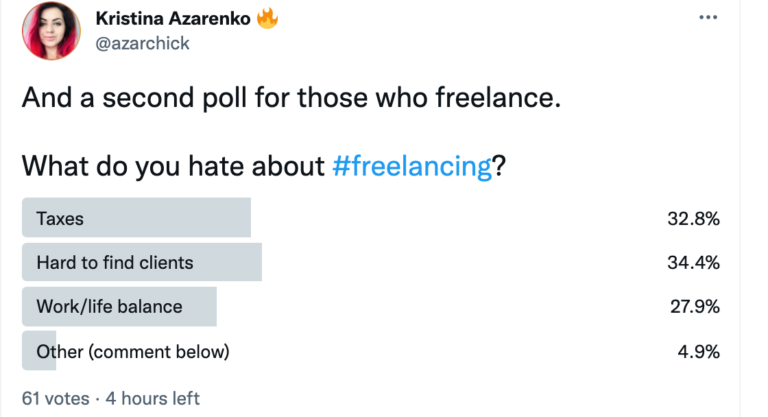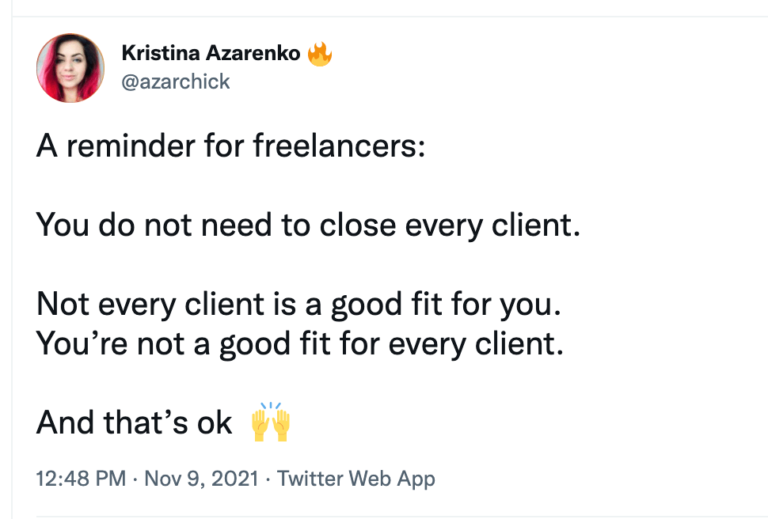
Editor’s note: As 2021 winds down, we’re celebrating with a 12 Days of Christmas Countdown of the most popular, helpful expert articles on Search Engine Journal this year.
This collection was curated by our editorial team based on each article’s performance, utility, quality, and the value created for you, our readers.
Each day until December 24th, we’ll repost one of the best columns of the year, starting at No. 12 and counting down to No. 1. Our countdown starts today with our No. 1 column, which was originally published on November 17, 2021.
This freelancing career-focused article by Kristina Azarenko shares really great expert tips to not only boost SEO freelancers’ careers but help set it up for continued success.
Congratulations, Kristina. Really well done! Thank you for sharing your expert thoughts and ideas as a contributor at Search Engine Journal.
Enjoy!
Freelancing is often romanticized and seen as an escape from an annoying boss who doesn’t value you.
But often, when people start working for themselves they quickly realize that they ‘quit 9-5 to work 24/7’.
Advertisement
Continue Reading Below
This can have detrimental effects on your self-worth and mental health, but it doesn’t mean freelancing is not worth it.
It can be a fulfilling experience if you get to it with the right mindset.
In this column, you’ll learn SEO freelancing tips that will help you find more (and better) clients, build a sustainable business, and truly love what you do.
But first, let’s take a look at why so many people choose to go freelance.
Pros Of A Freelance Career
I mentioned a few cons of starting an SEO freelancing business above. So now it’s time to balance it out with the pros of this journey.
When you are a freelancer…
You have more control over your time and life.
You don’t need to ask for permission to go to the dentist during the working day. You can even take a full weekday off, if your projects allow. Your schedule is your own.
Advertisement
Continue Reading Below
Your salary can grow quickly.
Search Engine Journal research shows that 60% of SEO professionals earn the same or more than the U.S. median while working full-time.
But growth is often limited by the years of experience one has plus it’s hard to substantially increase your salary within one company. You would often need to change jobs to get a bigger increase.
But when you’re an SEO freelancer, you don’t need to wait for a ‘3% yearly increase’ in your salary. You can make more faster.
I made my previous full-time job salary within the first year of freelancing, and I more than doubled it in the next year.
That’s not a unique result, there are many other success stories from fellow SEOs who decided to start their freelancing careers.
Moreover, there’s literally no limit to how much you can make since you can grow your freelancing business into an agency or something else.
Working with clients directly.
It was one of the most important pros for me as I wanted to have a bigger impact on my clients’ success.
You understand your clients better.
Being a business owner, you understand your clients better as you now know more about prioritization and estimating effort vs impact.
It helps you concentrate on the most meaningful recommendations instead of trying to fix all SEO issues.
I started my company two years ago without any business or freelancing experience, so I had to learn everything quickly.
Here are my 10 most valuable tips that I hope will help you get your SEO freelancing business up to speed (and keep you sane while doing it).
1. Talk To Other Freelancers
No matter where you are at, there are people who have already been there. They have experience and insights you can benefit from.
Getting tips from such people can save you months of figuring things out. I’m personally really grateful to Aleyda Solis, Luke Carthy, Andrew Optmisey, Kirsty Hulse, and Troy Fawkes, who were open with me and helped me with their valuable advice.
Advertisement
Continue Reading Below
A few tips on reaching out to people to ask for advice…
Be respectful of their time.
Don’t just DM your list of questions or something vague like ‘please help me.’ If you build relationships instead, people will be happy to help you.
Ask specific questions.
The answers you get depend on the questions you ask. So make sure you ask specific questions that would really move the needle for you.
You’re responsible for your decisions.
You ask people to get help, not to put responsibility for your business on them. So use common sense and see what’s working for you and what’s not.
2. Build Your Online Presence
You can be the best SEO ever. But if nobody knows about it, it’ll be hard to succeed.
We live in the world of so many voices on social media, and your voice should also be heard.
You can use LinkedIn to build your presence. You can use Twitter, start a newsletter, or do everything at once. The choice is yours.
Advertisement
Continue Reading Below
But trust me, it’s much easier to talk to prospects if you have a great digital footprint.
I started building my LinkedIn and Twitter presence two months before I quit my job. It did help me get first clients and first students into my SEO course.
3. Treat Yourself As A Business
When you start your own business, you are now an accountant, a salesperson, an account manager, a legal department.
And you also pay your taxes (yes, that’s frightening at first).
You need to account for this when pricing your services. It’s not enough to just calculate the hourly rate you had at a day job. You’ll need a few times more to cover all other expenses.
4. Learn To Price Your Services
Now you know that you’re a business, even if you’re currently the only person working in it.
The main goal of any business is to make a profit. So the next important thing is to embrace it and stop underselling yourself (it might be easier when you see your first tax bill).
Advertisement
Continue Reading Below
A few tips here:
- Don’t work for free.
- Use project-based pricing over hourly billing.
- Constantly improve and up your prices accordingly.
5. Learn How To Sell
When I started, I heard people saying “you’re not in the business if you can’t sell.” It would make me cringe every time.
I did not want to sell; in fact, I was afraid to do it.
Also, there’s a common misconception that if you’re good at your craft (in SEO in our case), you’ll automatically have many clients lining up to work with you.
That’s not true. In reality, selling and SEO are completely different skills. And you need them both to succeed.
Everything changed for me when I accepted this truth. I started learning to sell.
I’m not talking about door-to-door sales or sending annoying messages to your contacts on LinkedIn. It’s much more subtle.
Advertisement
Continue Reading Below
Whenever you jump on a call with a potential customer, you’re selling.
Even when you’re just talking or sharing your past wins, you’re selling.
You’re selling ideas, results, yourself as a professional, your agency. Any conversation with a prospect is a sale.
The sooner you understand it, the better.
See also: How SEO Professionals & Agencies Win New Business [Survey Results]
6. Create Processes And Systems
I hear so many people saying that they still don’t have a clear path they follow for an SEO audit or similar repeatable tasks.
It’s okay if you don’t have processes or systems right now. But it’s time to start building them.
Creating processes will help make your freelancing business more efficient and improve margins. Processes are also valuable for the delegation at later stages if you decide to hire someone else to help you.
You don’t need to create anything fancy. A process can start in the form of a simple checklist that you can expand over time.
7. Build Assets
When I started my freelancing business, I simultaneously started building a course.
Advertisement
Continue Reading Below
While I would not recommend everyone doing something big like that (as it’s exhausting), it’s still valuable to start building some kind of assets (for example, an ebook or a paid membership).
I truly believe that selling products in addition to services makes you a much better SEO as you learn a lot of marketing skills.
You start seeing audience research differently, learn copywriting, and understand your SEO clients much better.
Moreover, assets bring you passive income and they also keep you busy when there’s not a lot of client work. They can also grow into something bigger in the future – who knows?
8. Set Yourself Up For A Long Journey
Starting a freelancing journey is not easy. You’ll need to figure out many things quickly. It can also be lonely.
All this can lead to constant overworking and issues with mental health.
In fact, according to this poll I did on Twitter, work/life balance is one of the 3 hardest things in freelancing:
 Screenshot by author, November 2021
Screenshot by author, November 2021So it’s better to take care of yourself and your work/life balance before it’s too hard to remember who you are in life outside of your business.
Advertisement
Continue Reading Below
Here are some tips:
- Have a support group who would cheer you up (your spouse, friends, fellow freelancers).
- Have a hobby that is not connected to your work (and ideally doesn’t involve a computer, too).
- Schedule your leisure time.
- Set clear boundaries with yourself; don’t work 12 hours a day in your pyjamas.
All these small things will ensure you’re running a marathon, not a sprint (yes, it’s an allusion to SEO).
9. Know Your ‘Laws’ And Stick To Them
You can’t work on every type of SEO project out there. You can’t work with all types of clients who come to you.
Trying to help everyone will only burn you out.
Instead, you need to have clarity on what you do (your strengths), how you help (your services), and who you help (types of clients you work with).
 Screenshot by author, November 2021
Screenshot by author, November 2021You will find it hard to say ‘no’ to potential projects at first. But it will pay off in the long run.
Advertisement
Continue Reading Below
10. Help People Throughout The Way
You’re valuable. No matter where you are in your freelancing journey, you can help someone who is a few steps behind you in something.
You can help in any way that suits you: writing a blog post, tweeting your tip, answering someone’s question in a Slack group, etc.
Just know that your experience matters and one day (very soon) you’ll be the one helping someone who’s just starting.
Final Bricks
Life is too short to stay at a job you don’t like or work on projects you don’t enjoy.
When you open a freelancing journey for yourself, you’ll have no limits.
I believe in you.
2021 SEJ Christmas Countdown:
Featured image: Shutterstock/Harbucks




